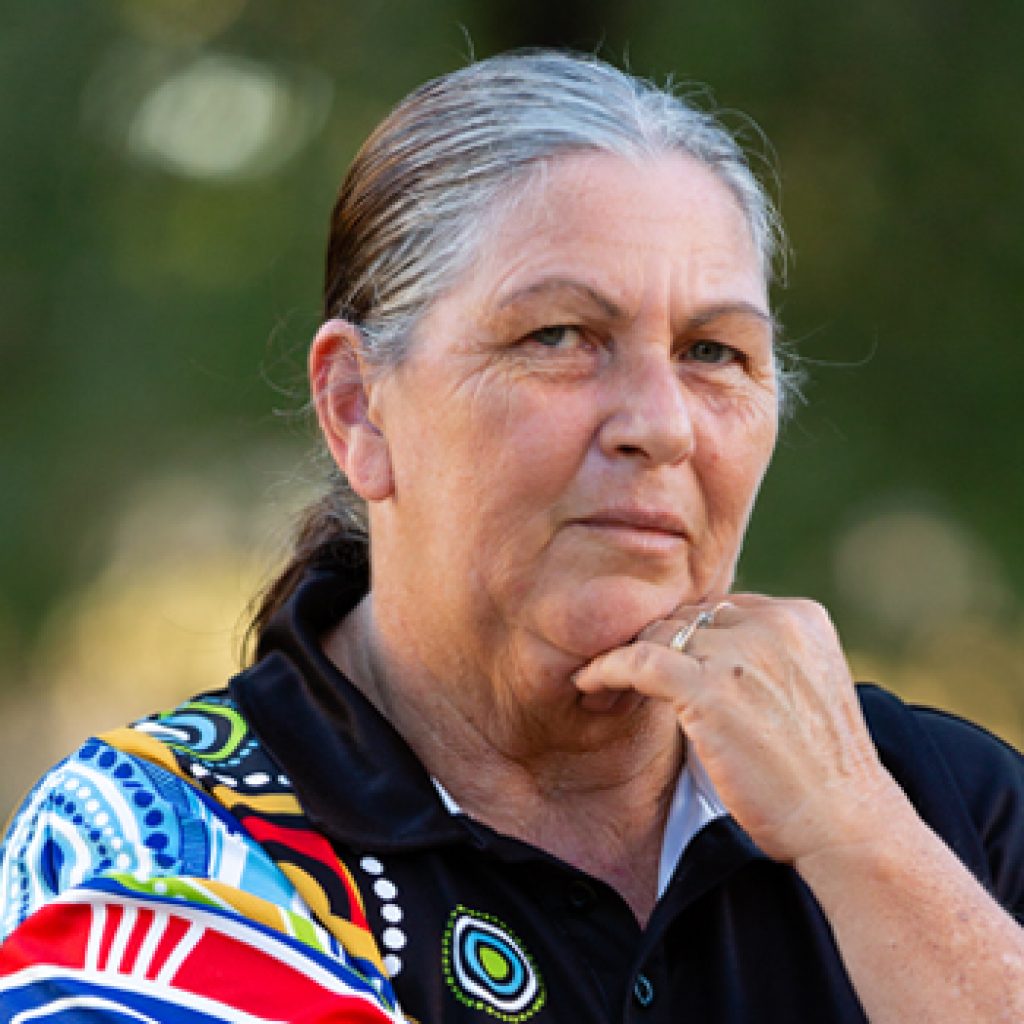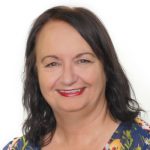
My greatest passion is engaging and educating kids in the classroom and through cultural activities. It’s so important for us to support and work for our kids so they can achieve what they want in life.
I was born in Emerald in 1965 and spent most of my life there. My traditional land,the Yumba, located on the Maranoa River outside of Mitchell in southern Queensland, is home of the Gunggari people. I have permission from some of the Kairi and Wangan (traditional Owners) Elders to conduct Welcome to Country in Emerald.
I was raised by my Mum, but never had the chance to meet my Grandmother or my Great Grandmother as they died before I was born.
My Great Grandmother was one of those who was taken and loaded in the back of a truck, to be locked up in a stockade. My Grandmother spoke fluent Aboriginal language that had been passed down the generations, but when my mother was a kid, she wasn’t really interested in the language.
During the late 1920’s aboriginal language was not encouraged as there was a lot of stigma about being Aboriginal. My mum is 92 now and the oldest living Gungarri Elder that I am aware of, but I know she has a lot of regrets now about not learning her mother’s language.
My Mum never had the chance to go to school, so I think that’s why she was very passionate about my education. I was the first one of my brothers and sisters that went past Grade 8, and the first female in my family to attend TAFE and University. I’m proud to say that once my daughter graduates High School this year, she will be the second generation of women in my family to attend University. That’s pretty big in our family and I’m very proud of her.
In our family, the leadership role is handed down from youngest girl to youngest girl. My Grandmother was the youngest and my Mother was the youngest, and then myself, and now my daughter will take this role. If anything affects the younger generation in our family, she is the person who has to step up and accept her responsibility to guide and encourage them.
Education was important to my Mum, and it’s important to me too. I’m really proud to pass that focus onto my daughter, who was the first Indigenous girl to become School Dux at her Primary School. She’s the first Indigenous girl to get on the honours roll at Emerald State High School, was top percentile for NAPLAN, and is currently on track for an OP 4-7 for University where she wants to pursue a Bachelor of Science or a Bachelor of Mathematics. My daughter was successful with the QATSIF application to fund her senior education, enabling her to complete her QCE. he is also the current Year 12 Indigenous leader at her school for 2018.
My son is autistic, has ADHD and epilepsy, therefore his multitude of problems has impacted negatively on his life. He has achieved many successes, such as obtaining his Queensland Certificate of Education and completing several Certificate II courses. He was determined to obtain his driver’s licence despite his epilepsy, and at the age 23 he has his learner’s licence.
He lives downstairs from my family independently, does his own washing and own cooking, overall doing quite well. He has a big focus on his Aboriginal art, but extremely talented with water colour, pencil and ink drawing and 3D sculpturing. I think this shows that everyone learns things differently – he’s even won all of the Central Highlands NAIDOC awards. He has also achieved great success winning CH Art Exhibition awards for categories he has entered. This is because his art is quite outstanding.

What does NAIDOC Week mean to you?
In so many ways, I think it’s about showcasing our culture. NAIDOC Week is a really positive way of raising awareness with other people, so that they understand where we come from as Aboriginal people.
I think in my everyday life (and through my role in education), the perspective of Aboriginal and Torres Strait Islander people is extremely negative. So to me, NAIDOC is one way you can showcase our people in a very positive light.
In my career, I’ve worked in schools and community for approximately 20 years delivering a range of NAIDOC and educational programs. I have successfully completed a Certificate II, II and Diploma in Aboriginal and Torres Strait Islander Education. I won the Aboriginal Student of the Year and Trainee of the Year in 2002 for Central Highlands and Central Queensland, whilst employed by Emerald SHS. I made it through to the Queensland finals, but unfortunately did not make it to the Australian Awards. I am currently studying for a Bachelor of Primary School Education.
I think my big love is around engaging and educating children. So, whether it’s in a classroom or through the cultural activity, 9 out of 10, can be engaged through this process.
Students learn about their culture during these arts and crafts programs that I plan, implement and deliver. Student’s connection to culture builds their belief in themselves and provides insight into their cultural identity, of who they are. Hands-on activities is a way of building positive relationships with students, therefore transitioning successfully into the classroom environment.
At Emerald North State School, the Principal and I created a NAIDOC Model Kit. The Kit had many different aboriginal cultural activities, lesson plans and resources to run each activity. I held training sessions with the school staff, demonstrating to the teachers how to use the kits in their classrooms. I can say from experience that these cultural activities are really engaging for our Indigenous students, and it also builds capability of staff in schools.
The Principal and Head of Department developed a Literacy and Numeracy Resource Toolkit that was designed to support Individual Learning Plans. The school was “Highly Commended” at the Central Queensland Showcase Awards.
It’s so important for us to support and work for our children so they can achieve whatever it is they want in life. We need to encourage them, to raise their expectation of what they can really achieve.
My current role is with the Queensland Department of Education as an Indigenous Pathways and Partnerships Coordinator for the Emerald/Longreach/Mackay region. We work strategically with school staff to build capability in schools and for Year 12 Indigenous students to successfully gain their Queensland Certificate of Education (QCE). The 2018 Queensland goal for students to attain their QCE is 98%. In 2017, Year 12 Indigenous QCE attainment was 97%, therefore missing the State target by 1%.
I visit high schools across the region, to check which Year 12 students are at risk of attaining QCE, and what strategies Year 12 Coordinators have implemented for students to achieve success.
My role is strategic, but I have been known to go into operational mode, drive 2 hours to dig a student out of bed, so that he goes to school, sits his exam, therefore providing enough points to achieve his QCE. It is not part of my role to be hands on but I do it anyway and sometimes that’s what makes it work
I have also taken on a Case Management role for a student, which provided in-class support and wellbeing support. I stood in the line congratulating this student as he completed the walk of honour, with his graduating class. I saw this student recently and he said:
Charmaine, I’ve found a job and it’s all that ranting and all that support that you did.
In my next Educational phase I would like to work more proactively to minimise suspensions, decrease cancellation of enrolments, increase staff capability so that students are engaged more in learning, students attending school more frequently and achieving higher academic results. We, as educators need to build lasting and more effective relationships with students, parents, carers and community people, which are a viable sustainable option rather than a quick fix to problems that arise.
I would also like to expand the outreach program, so that I can build better relationships with parents and carers, offer more information to support them, introduction of parent groups or elder groups within schools to build stronger connections between Indigenous Community and School Staff. I feel that when educators and parents are working together to achieve common goals, our children will achieve higher levels of success. Outreach is part of the Community Engagement Program that I have been working on for the past 4 and ½ years, and due to finish in December 2019.
My mother has been the most inspirational person in my life, and it is “Because of Her, I can”. To me, that’s what it’s all about.


